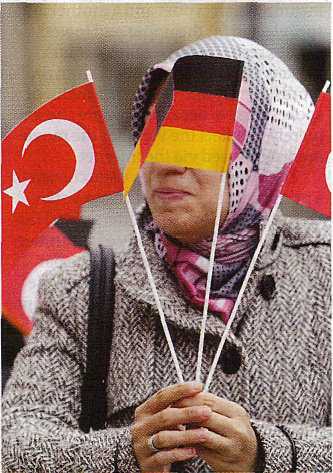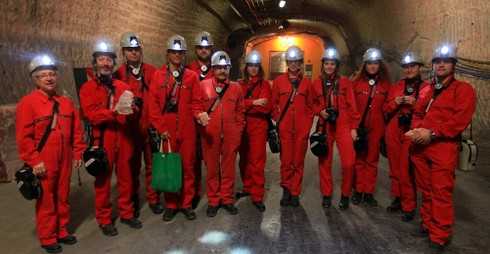As the eurozone crisis shows signs of further deepening with the new uncertainties in the wake of Italian ‘non-elections’, Germany is increasingly under strain to keep the European Union intact.
Berlin has to deal not only with the brewing anti-austerity and anti-unionism in the Mediterranean strip of the EU (all the way from Cyprus through Portugal, except, perhaps, France), but also with an uneasy Britain and loudly impatient Turkey on the continent’s both flanks.
In that context, German Chancellor Angela Merkel’s visit to Turkey must be added as another positive step toward melting the icy relationship between Ankara and the EU.
It follows two other important recent steps. First, France unblocked a chapter (of five) of Ankara’s negotiations with Brussels, coming during its current peace talks with the Kurdistan Workers’ Party (PKK), and secondly, Greek Cypriots overwhelmingly (57.5 percent) voted for the Democratic Rally (DISY) leader, Nicos Anastasiades in the presidential election, a strong signal of a mood change on the island.
Merkel’s visit was long overdue. It has been well-noted that she has visited Turkey only once in three years, while Prime Minister Recep Tayyip Erdoğan has visited Germany four times.
Should it be interpreted as the Christian Democratic Union of Germany (CDU) now being in accord with its coalition partner, the Free Democratic Party (FDP), about the strategic importance, economic performance and crucial democratic transformation of Turkey? Perhaps. Does this mean that the German chancellor comes closer to CDU heavyweights who have been vocally pro-Turkish membership, such as Ruprecht Polenz, Chariman of the Bundestag’s Committee on Foreign Affairs, and gets ready to be challenged by others within?
Could be. Deep down she knows that she has the backing of those CDU strong figures, on central and local level, although a few, about remaining committed to coalition protocol on Turkey’s accession and support for it to continue. But a slight challenge nevertheless.
No matter what,one can hope that the visit and the positive sound of her messages indicate a long-lasting change of mind.
Cynics in Turkey and Germany think they have seen “no progress” between Erdoğan and Merkel on Turkey’s EU accession process. Populist Bild Zeitung, in another outburst of sensationalist Turkophobia, totally insensitive to Turkey’s internationally important democratization process as ever, declared that ‘Turkey would never be a full member of the EU’ — despite its powerful economy. (This view reveals more about some parts of the Europe than Turkey itself).
Bild is joined in Turkey by voices that have been anti-reform, anti-AKP and anti-Europe.
The truth, and the good news, is, Merkel not only endorsed France’s unblocking move, but also signaled that other chapters may follow, with perhaps a second one even before the end of the Irish term presidency in the EU. One understands that she needs to balance very carefully in an election year for Germany on a subject which can shake and stir the votes.
There are many aspects to why Germany should be more active, frank and clear about its relations with Turkey and its policy on the EU negotiations. Pro-EU arguments based on today’s Turkish economy speak for themselves, as outlined by Kemal Derviş, the vice president of the Brookings Institution in Washington, D.C., and a former minister of economic affairs of Turkey, for the daily Handelsblatt on Feb. 25, 2013 in an article titled “Die Politik ist am Zug” (“The policy is on track”).
Apart from fine figures on inflation, growth, reduced deficit, employment, strong currency and reserves, German politicians do look with admiration at “hardworking” Turks (a virtue they value highly), when they compare them with the Mediterranean citizens of the EU.
Turkey with such an economy is now too big for Germany to ignore, and far too important to be seen only as a simple trading partner, no doubt. Therefore, the tough visa regulations and the particularly rigid implementation of it attributed to German general councils in Turkey must be eased — liberalized in the sense that, once having passed a security check, Turkish citizens must be given five-year, multiple-entry Schengen visas.
Nor should there be any doubt that increasing defense cooperation through NATO on Syria creates a new momentum for Berlin to realize more deeply Turkey’s significance on the southeastern flank of the continent, as it shoulders increasing burdens. Stability in Turkey, in that sense, can be said to be serving the stability of Germany, and of Europe as a whole.
Merkel did not say much on Turkey’s Kurdish peace process, but given the presence of large, politicized Turkish communities; Alevi and Kurdish diasporas in her own country — take it for granted that solutions on all social rifts here will ease tensions there. Interests overlap.
And in that case, it is demanded that Germany more thoroughly consider indirect, discreet assistance to endorse Turkey in its struggle against historical demons. The EU membership process, kept alive and well, is the best help.
What Bild Zeitung and other populist tabloids do miss is that, what still matters most for Turkey’s reformist camp is the perspective of, and not necessarily, membership.
Given the current turmoil and identity crisis the EU is in, it can be said that there will have to be referendums on Turkish membership — in Europe and Turkey – between now and the final decision. The process is still premature: It needs a decade or more. So, no need for myopia.
Merkel is certainly right in her arguments about Cyprus (that Turkey opens its sea and airports to its flights and vessels), even if it is an issue that still needs time, given the stalemate. Before that, both sides on the island must show a concrete, willful progress on reaching a settlement.
It has become also clear that Erdoğan is willing to resolve the issue in a broader context.
He expects a complementary signal from Anastasiades, and has in mind a “package solution” that should involve Cypriots as well as Greece, energy, security and economic cooperation in Eastern Mediterranean, with the backing of Britain and the U.S.
Germany can play a crucial role, in both EU and NATO context, if Erdoğan’s ideas make any sense.






